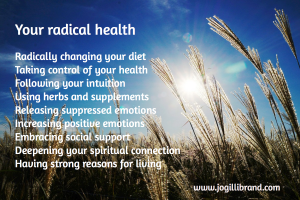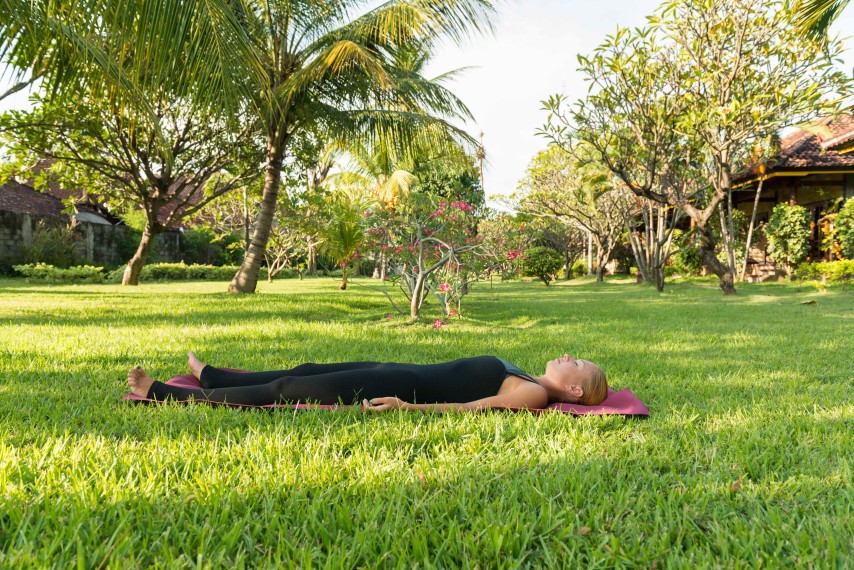You’ve undoubtedly heard of at least one person who’s had an apparently miraculous healing from cancer. People who become healthy again after finding themselves in a terrible situation occasionally make it into the media, but surprisingly, they don’t get seriously researched that often.
It seems there are two key reasons for this omission:
- it’s said that doctors don’t want to give patients ‘false hope’, and
- it doesn’t seem to be in anyone’s immediate financial interest (cancer treatment drugs are expensive, and because virtually all medical research is done by pharmaceutical companies, the majority of their expenditure is spent on cancer-relieving, rather than cancer-preventing, drugs)
That looks like that’s not only a scandal, but also a disaster. What if there’s something happening in these remissions that could be replicated? What if there’s something that could stop many lives being wrecked and lost? What if more people could be healthy for longer? Surely that’d be worth knowing more about.
Pro-active prevention
That was Dr Kelly Turner’s impetus for learning everything she could about the ‘miracle’ cases where cancers disappear and this isn’t currently medically explainable. After years of research, she wrote “Radical Remission” and it’s full of amazing case studies as well as conclusions from the dozens of interviews she did with people whose cancers were healed in unconventional ways.
The author isn’t claiming that all cancers can be cured, nor is she suggesting that people don’t make use of surgery and drugs, and she’s definitely not saying there’s one answer for everyone. She is saying, though, that it’s worth listening to the many people who’ve been on their own healing journey to find out whether there are commonalities that could be of help to others in similar situations.
I’m inspired by the attitude that says let’s learn from people who are getting intentionally healthier. It reminds me of the positive psychology movement, which was born when researchers started to study healthy minds and attitudes. If we want to be happier, why not find the people who are intentionally experiencing happiness already, instead of concentrating solely on people who are suffering and trying to turn those lessons upside down? Surely if we want to know what might work, we’ll study what’s already working rather than focussing on what’s not?
When Dr Turner started looking at cancer patients in remission, she found some interesting things. She learned that these people had understandably tried many approaches, which she distilled into 9 commons actions. These range from massively improving diet, to releasing difficult emotions, to answering for themselves why they really wanted to live.
The Radical Remission activities
When you see the full list of actions, they look like a recipe for all-round health.

All the ways to become radically healthy
What if we could use these activities as way of releasing many illnesses in addition to cancer? And, as importantly, given that ill-health is wreaking havoc on individuals, families and whole nations (because of treatment costs) what if they could be guideposts for establishing and maintaining good health in the first place?
Can you be radically healthy?
The suggestions below for incorporating the radical remission guideposts into your own life are all drawn from the natural and inexpensive worlds of mindfulness, yoga and the Ayurvedic lifestyle:
1. Radically changing your diet
The majority of cancer patients Dr Turner interviewed cut out sugar, based on their own reading of recent research. They also cut out meat, dairy and processed foods. If that seems drastic, remember that the stakes were high and so motivation was high. If it feels too extreme for you now, perhaps ask yourself: what single positive change can I make to my diet? And what’s the simplest step I can take towards this today? Then make that change, based on your own stakes and motivation.
If you want to be inspired by Ayurveda, try matching the types of food you eat with your natural physical constitution (called dosha in Ayurveda). If you don’t already know your dosa you can get a quick insight with this short online questionnaire. Once you know your dosha, consider which foods to favour and avoid. [Let’s be clear: I’m not a doctor or a nutritionist, so I’m not advising you at all. Please take action guided by your own good sense and any advice you need from a qualified medic.]
Remember, you are quite literally what you eat. Bringing this mindfulness to your food choices offers a very frequent opportunity to enhance the quality of your life.
2. Taking control of your health
Prioritize your health every day. Use the gentle curiosity of mindfulness to really know what makes you feel good. Then make it your mission to do more of those things. When we’re taking an active interest in our own health, we’re more likely to be healthier than when we leave it to someone else (even wonderful, well-qualified doctors) to manage or fix.
Perhaps invite yourself to be an even more inquisitive, active, engaged human being, so that your health is in your hands as much as possible.
3. Following your intuition
Listen to your intuition more by setting aside some time every day to be silent. If there’s too much noise around us all the time, how can we hear the quiet inner voice that guides us to health. We’re experts on ourselves if we can only listen more closely. And act on what we hear.
How can you spend more time in silence every day? Even 5 or 10 minutes of quiet time alone, perhaps sitting in meditation or practicing mindful movement, is likely to be enough for your inner voice to speak up and be heard.
4. Using herbs and supplements
Along with food, natural herbs and supplements can be used to strengthen the immune system. In Ayurveda, while we’re acknowledging what’s ‘wrong’ with a person’s health, we’re placing great attention on what’s already positive and doing whatever we can to increase that.
In a similar vein, perhaps there are there natural remedies that you’re drawn to. If so, how can you incorporate those into your routine? How can taking a herb or supplement be a ritual that reminds you that you’re focusing on growing the positive things in your life?
5. Releasing suppressed emotions
It’s hard to get through life without carrying some emotional baggage. The more of this heaviness we can release, the lighter we’ll feel. Now that we know that the mind-body is a single entity, it allows us to be really confident that letting go of negative emotions can only do us good, and is likely to keep us healthy in body as well as in mind.
This doesn’t necessarily mean getting angry and pounding a pillow. In mindfulness, we learn ways of acknowledging difficult emotions, and being with them in a kind way. Sometimes just the light of gentle awareness changes the way things look to us. Other times, more active practices are needed. There’s no doubt that this can be challenging, which is one of the reasons it’s advisable to learn mindfulness from an experienced teacher who’s already trodden at least some of this path.
Maybe ask yourself what emotions you might be suppressing, whether you’re willing to let them go, and then research options to help you do that.
6. Increasing positive emotions
When we’ve let go of the negative, there’s more room for the positive. By savouring experiences that help us feel good, we are creating new connections in the brain that mean we’re more likely to notice even more positives. So don’t just let the good stuff slip by unnoticed amidst the busyness of life. Stop for a moment or more and savour what you appreciate.
What is positive in your life that you can genuinely appreciate today? What can you turn up the volume on right now?
7. Embracing social support
Humans are naturally gregarious, no matter whether we’re personally introverted or extroverted. Reaching out for connection and allowing other people to give you support is powerful stuff. Research shows that the more social connections we have, the longer and more healthily we’re likely to live.
8. Deepening your spiritual connection
Whether using wide or narrow definitions of spirituality, understanding what we believe our role in the Universe to be is very practical because of the great sense of peace it can bring. So there’s nothing woo-woo about this approach; whether we’re strictly rational humanists or actively religious, when we’re deepening our spiritual connection we’re contributing to peace in ourselves and therefore in our world.
In yoga, we use the term prana to refer to the life-force that is evident everywhere. Life and abundance cannot be denied; we simply look around at weeds sprouting through cracks in the pavement to know that to be true. How can you honour the pranic life-force in you today? What wants to be expressed and how?
9. Having strong reasons for living
Answering this question is often the work of a lifetime! Perhaps it’s enough for the moment to connect with the reasons you have right now, and find ways of giving them life.
Truly holistic living
I find that there’s something beautiful and poignant in the broad arc of these questions. This beauty and poignancy is mirrored in the journeys of the people who once had cancer who inspired them.
If you feel inspired, too, please start with whichever question your intuition guides you to; there’s no particular order to them. Begin where you are and see where the answers take you. If you prefer to have a structured approach with support, take a look at my 90-day programme.
I hope and wish that your questioning and answering leads you to your own radically good health.





Join the conversation